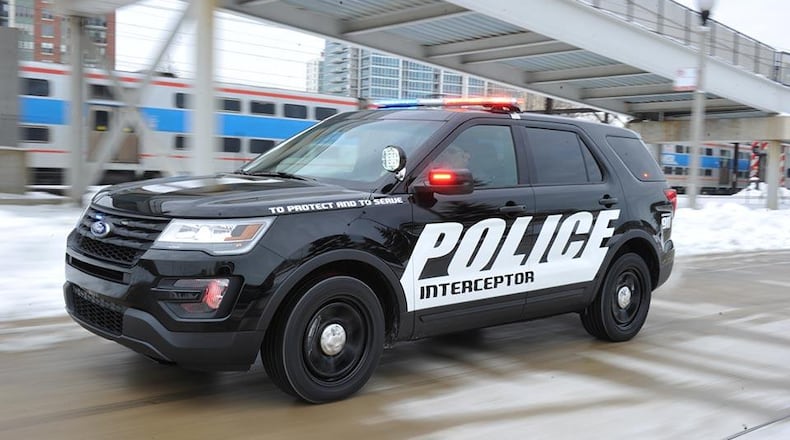At least 100 employees at Ford Motor Co. recently called on company executives to end the production of police cars — the latest example of a major corporation coming under pressure amid the national cultural shift on racism and police brutality since George Floyd’s death.
Company CEO Jim Hackett has since responded, saying “The issues plaguing police credibility have nothing to do with the vehicles they’re driving.”
The letter from staff urged the company to "cease development, production, and sale of all custom police vehicles and products," according to the Detroit Free Press, which cited technology news website The Verge.
“Our resources can and should be diverted to other forms of first response and public safety,” the employees wrote.
Workers also raised the issue during a recent virtual town hall.
"Other employees have since signed onto the letter (though it's unclear how many) and they want the company to take some kind of action by July 15," according to the Free Press.
The internal matter was first reported by the automotive news website Jalopnik.
CEO Jim Hackett cites ‘safety of our society’
Hackett sent a response on July 1 to senior staff, saying the second-largest U.S. automaker would stand by its commitment to first responders who “play an extraordinarily important role in the vitality and safety of our society.”
In the letter, Hackett and Executive Chairman Bill Ford acknowledged the current policing issues and also expressed support for reform and the Black Lives Matter social justice movement.
Both men, along with GM CEO Mary Barra and Fiat Chrysler CEO Mike Manley, have expressed a desire to provide corporate leadership and to continue a public dialogue on meaningful police reform.
“It’s our belief the recent issues surfacing from the George Floyd tragedy are bringing a very intensive and necessary spotlight on police training and reform,” Hackett, 65, said in the letter.
Reports say Black and white employees expressed their concerns in “respectful” conversations with company leadership, and that workers were equally passionate about supporting both law enforcement and people of color.
“We want to hear and listen to all employees, understand their point of view and be transparent about the actions and positions we are taking,” Mark Truby, chief communications officer at Ford, told the Free Press. “It’s a healthy dialogue.”
The George Floyd effect
Floyd died on Memorial Day after a Minneapolis officer held him down with a knee on his neck for nearly eight minutes, sparking the protests around the world.
In the weeks since, polls have revealed a dramatic shift in how Americans view police violence, with most now acknowledging that Black people are more likely to be targeted, mistreated or even killed by those who are sworn to serve and protect.
Detroit auto executives have been visible in their public calls for racial justice and police accountability, according to reports.
“Our world wouldn’t function without the bravery and dedication of the good police officers who protect and serve,” Hackett said in his statement. “But safety of community must be inclusive of all members and today, it is not.”
Ford’s chief executive said he also faced public pressure to reconsider producing the trademark police vehicles.
The 117-year-old company has a long history of investing in the Black community and providing job opportunities when others did not, the Free Press reports.
Ford is the largest producer of police vehicles in the country.
The Ford Police Interceptor sedans and SUVs are only a small portion of the more than 2 million vehicles that Ford sells in the U.S. every year, but that still outpaces every other automaker’s output by nearly two-thirds.
“It’s not controversial that the Ford Police Interceptor helps officers do their job,” Hackett wrote.
‘Defund the police’
The recent deaths of Floyd, Breonna Taylor, Rayshard Brooks and others have ignited calls to “defund the police,” a controversial protest movement advocating for taking funds used to pay officers overtime and redirecting them to mental health, social services and community youth programs that have been defunded in the years since the Sept. 11 attacks.
The movement also seeks systemic reforms, including increased accountability and deescalation training, and the ending of the qualified immunity legal doctrine, which shields officers from civil lawsuits in fatal shootings.
Sea of change
A sea of change has been sweeping the country for weeks as more municipalities and big companies embrace the BLM movement or face social pressure to reconsider current practices.
Confederate statues and symbols have been toppled nationwide.
For the first time ever, major corporations are pledging to install more Black managers and senior executives in the coming years.
Popular food brands such as Aunt Jemima, Mrs. Butterworth’s, Uncle Ben’s and Cream of Wheat are all abandoning brands that have racially stereotyped people of color for decades.
Cosmetic skin “whitening” creams are being phased out.
The NFL appears ready to allow kneeling during the national anthem, several years after the league blackballed 49ers quarterback Colin Kaepernick for silently taking a knee as a form of protest against police brutality.
The Washington Redskins and Cleveland Indians are under renewed pressure to change their team names.
Ford, meanwhile, is not the only company to face internal turmoil for a tangential connection to the controversy over race and policing.
Major advertisers, Ford among them, are boycotting Facebook over the company’s soft stance on misinformation and hate speech.
In early June, Facebook employees staged a virtual walkout over the issue of President Donald Trump’s inflammatory posts, which CEO Mark Zuckerberg insisted did not violate the platform’s terms of service and even doubled down after receiving continued complaints.
In recent weeks, however, Zuckerberg has been scrambling to mend fences, regularly meeting with senior staff, advertisers and civil rights leaders on the best path forward.
About the Author

